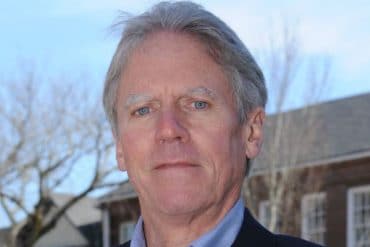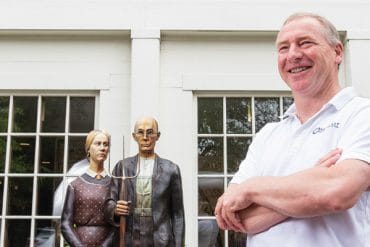 David Rubenstein is the cofounder of The Carlyle Group, one of the largest private equity firms in the world. A former domestic policy advisor to President Jimmy Carter, Rubenstein is considered one of the most savvy and influential business leaders in the country. He has generated significant attention for his purchase of historical documents, most notably the Magna Carta and Emancipation Proclamation, and for signing the Giving Pledge, a commitment to donate more than half of his considerable wealth to philanthropic causes and charities. A longtime Nantucket summer resident, Rubenstein is a featured speaker at the Nantucket Project, and recently met with N Magazine for an exclusive interview at his home on the island.
David Rubenstein is the cofounder of The Carlyle Group, one of the largest private equity firms in the world. A former domestic policy advisor to President Jimmy Carter, Rubenstein is considered one of the most savvy and influential business leaders in the country. He has generated significant attention for his purchase of historical documents, most notably the Magna Carta and Emancipation Proclamation, and for signing the Giving Pledge, a commitment to donate more than half of his considerable wealth to philanthropic causes and charities. A longtime Nantucket summer resident, Rubenstein is a featured speaker at the Nantucket Project, and recently met with N Magazine for an exclusive interview at his home on the island.
N MAGAZINE: Everyone knows you in the finance world, but can you talk a little bit about your past political life as an advisor in the White House?
DAVID RUBENSTEIN: I’m a lawyer by train- ing, but I wasn’t that good of a lawyer. If I was, I would be practicing law. I went to work in New York for a firm where Ted Sorensen was working. He was John Ken- nedy’s brilliant advisor and speechwriter, and I spent some time working with him and ultimately he helped me get a job in Washington. That led to me working in the campaign for a man named Jimmy Carter, who got elected. Although I was only twenty-seven, I got a job as the Deputy Domestic Policy Advisor to the President of the United States.
N MAGAZINE: From what I understand of the Carter administration, that might have made you the oldest person.
DAVID RUBENSTEIN: I wouldn’t say the oldest, but I would say I wasn’t qualified for my job, and I didn’t feel out of place. We were very young and inexperienced, but it was a great training ground. I worked for four years around the clock. I didn’t take a day off. Traveling with the President of the United States when you’re twenty-seven years old is a nice thrill. Unfortunately I helped get inflation to 19%, which is not good, and mortgage rates to 22%. So when inflation gets as high as 19% or mortgage rates 22%, you’re probably not going to be reelected, so we lost in 1980 and I had to go back and practice law. I started my in- vestment firm in 1987. I was thirty-seven. That is principally what I do, that and philanthropic things that I’m involved with.
N MAGAZINE: Can you talk about your philanthropic pursuits?
DAVID RUBENSTEIN: I am interested in what I’ve called “patriotic philanthropy.” I believe people who have been fortunate like me should give back to their country. I put up money to repair the Washington Monument, and I’m going to do more and more things like that as a way to get people to think, “You know, I’ve had a great life in this country, maybe I should give money not only to a hospital or university, but to things that are more connected to our country because the country can’t afford these things.”
I got very lucky in my business and made more money than I deserved. I signed the Giving Pledge with Bill Gates and Warren Buffett and I’m going to give away the bulk of my money. I am the chairman or co-chairman of the board at Duke, Harvard, University of Chicago, The Smithsonian, Kennedy School, and Kennedy Center. So I’m chairing or co-chairing six national campaigns.
But there are philanthropists in our country, and I know them pretty well, who are doing much more significant things than me, because they have much more money. Bill Gates, Melinda Gates, Warren Buffett, Mike Bloomberg — these are really great philanthropists. Most of my philanthropy is in education and medical research, but the historical part gets much more attention because nobody else is doing it.
N MAGAZINE: You appear to be quite a history buff, can you elaborate on that?
DAVID RUBENSTEIN: I am speaking next weekend at the Nantucket Historical Association because they asked me to talk about the Gettysburg Address. I spoke there last year on the Declaration of Independence. I am a businessperson who buys some historical documents and I can make an intelligent speech about those documents, but I am not a scholar. I just spoke at the Aspen Ideas Festival about the Thirteenth Amendment and contrasted that with what happened in the movie “Lincoln.” I just gave a speech there as well on Martin Luther King’s “I Have a Dream” speech, which is almost fifty years old. But I am not a historian. I am not a scholar. I am just a businessperson who, compared to some people in the audience, may know more, but I’m not a scholar.
N MAGAZINE: You said that all American history should be shared, both the good and the bad. What did you mean by this?
DAVID RUBENSTEIN: Most people who write history for their country don’t write the worst things. I’ve bought two copies of the Emancipation Proclamation and a copy of the Thirteenth Amendment. One of the Emancipations is in the Oval Office and the other two documents will go to the African American History and Culture Museum in the Smithsonian. When I give speeches about them, I talk about slavery and how unbelievable it was. People don’t realize how terrible it was. I mean they understand it intuitively, but when you go through the details it’s unbelievable.
I think anybody who talks about history has to talk about the good and the bad. When you talk about Thomas Jefferson, as I love to do because I think he’s great, you have to remember when he wrote, “All men are created equal,” he had two slaves with him. He owned sixty slaves at that time and he owned a couple hundred during his lifetime. Yes, he was a great man. George Washington was a great man and he had a couple hundred slaves as well. Out of the first fifteen presidents, nine of them owned slaves. More than half the people that signed the Declaration of Independence owned slaves. So yes, we have to tell people that the Declaration of Independence was a great document, the Constitution was a wonderful document, but the people that signed it were slave owners to some extent and they believed in slavery.
N MAGAZINE: Let’s move to the economy. During the deepest darkest days of the Great Recession, were you ever worried that the entire system was going to collapse?
DAVID RUBENSTEIN: Well at the Aspen Ideas Festival, I interviewed Tim Geithner about it, and had a discussion with Jack Lew and with Henry Paul- son and Bob Rubin about it. I did think that one weekend, as events unfolded, turned out to be a more dangerous weekend than we may have realized. Ben Bernanke and Henry Paulson went to Congress and said, “If you don’t pay us TARP, the entire system will collapse. The entire economy will collapse.” Members of Congress, if you remember, didn’t pass it the first time. They were still not happy with what was proposed, but eventually they passed it. I think we came closer to a meltdown than we had any time since the Great Depression, but the resiliency of our system is such that we bounced back.
N MAGAZINE: Is China still the investment darling that it has been?
DAVID RUBENSTEIN: The United States is still the greatest country in the world to invest, bar none. There’s nothing comparable be- cause even though our growth rate is 2.5%, the rule of law, trans- parency, quality of financing, quality of managers, quality of exit opportunities—nothing is comparable. If you eliminate the United States, the most attractive place to invest is China.
China will grow, not at 10%, which it did for thirty years in a row, which no country had ever done before, but it will grow at 7.5% to 8%. Think about it: Suppose we had 8% growth? We’d be pretty happy.
They have a lot of problems in their economy, but we should have some of those problems. China will be the greatest place in the world to invest, and I analogize it to the United States. If you had invested in the United States in 1913, you’d probably ultimately have done okay. If you invest in China in 2013, you’ll probably do okay.
N MAGAZINE: Would you call yourself an optimist or is the golden age of prosperity for the middle class something that’s behind us?
DAVID RUBENSTEIN: I’m an optimist in the sense that I think the United States has recovered from the worst of the Great Recession. We have enormous pluses in this economy: the research and development, budgets of our economy, the resiliency of the economy generally, the higher education universities, the Silicon Valley mindset, the reinvention of our economy from time to time. But we’ve got some problems. K–12 is terrible. Income disparity is getting worse. We have much more competition from overseas than we ever did…I’m an optimist but I wouldn’t want to make it sound like, “The best days of the United States are so far ahead of us that we clearly don’t have to worry about competition.” I don’t think that’s the case.




